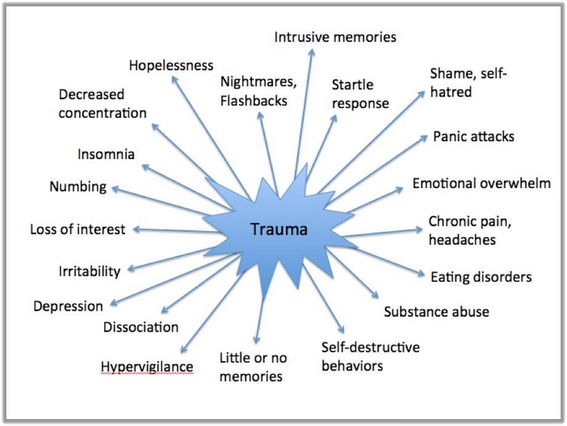
Definition
PTSD is a disorder that develops in some people who have seen or lived through a shocking, scary, or dangerous event.
If you are involved in or witness a traumatic event,
it is common to experience upsetting, distressing or confusing feelings afterwards. The feelings of distress may not emerge straight away – you may just feel emotionally numb at first.
After a while you may develop emotional and physical reactions, such as feeling easily upset or not being able to sleep.
Nearly everyone will experience a range of reactions after trauma, yet most people recover from initial symptoms naturally.
Signs and Symptoms
Not every traumatized person develops ongoing (chronic) or even short-term (acute) PTSD.
Symptoms usually begin early, within 3 months of the traumatic incident, but sometimes they begin years afterward.
To be diagnosed with PTSD, an adult must have all of the following for at least 1 month:
- At least one re-experiencing symptom
- At least one avoidance symptom
- At least two arousal and reactivity symptoms
- At least two cognition and mood symptoms
1. Re-experiencing symptoms include:
Flashbacks-reliving the trauma over and over, including physical symptoms like a racing heart or sweating
Bad dreams
Frightening thoughts
2. Avoidance symptoms include:
- Staying away from places, events, or objects that are reminders of the traumatic experience
- Feeling emotionally numb
- Feeling strong guilt, depression, or worry
- Losing interest in activities that were enjoyable in the past
- Having trouble remembering the dangerous event

3. Arousal and reactivity symptoms include:
- Being easily startled
- Feeling tense or “on edge”
- Having difficulty sleeping
- Having angry outbursts

4. Cognition and mood symptoms include:
- Trouble remembering key features of the traumatic event
- Negative thoughts about oneself or the world
- Distorted feelings like guilt or blame
- Loss of interest in enjoyable activities
Do children react differently than adults?
Children and teens can have extreme reactions to trauma, but their symptoms may not be the same as adults. In very young children (less than 6 years of age), these symptoms can include:
- Wetting the bed after having learned to use the toilet
- Forgetting how to or being unable to talk
- Acting out the scary event during playtime
- Being unusually clingy with a parent or other adult
Older children and teens are more likely to show symptoms similar to those seen in adults. They may also develop disruptive, disrespectful, or destructive behaviors. Older children and teens may feel guilty for not preventing injury or deaths. They may also have thoughts of revenge.

